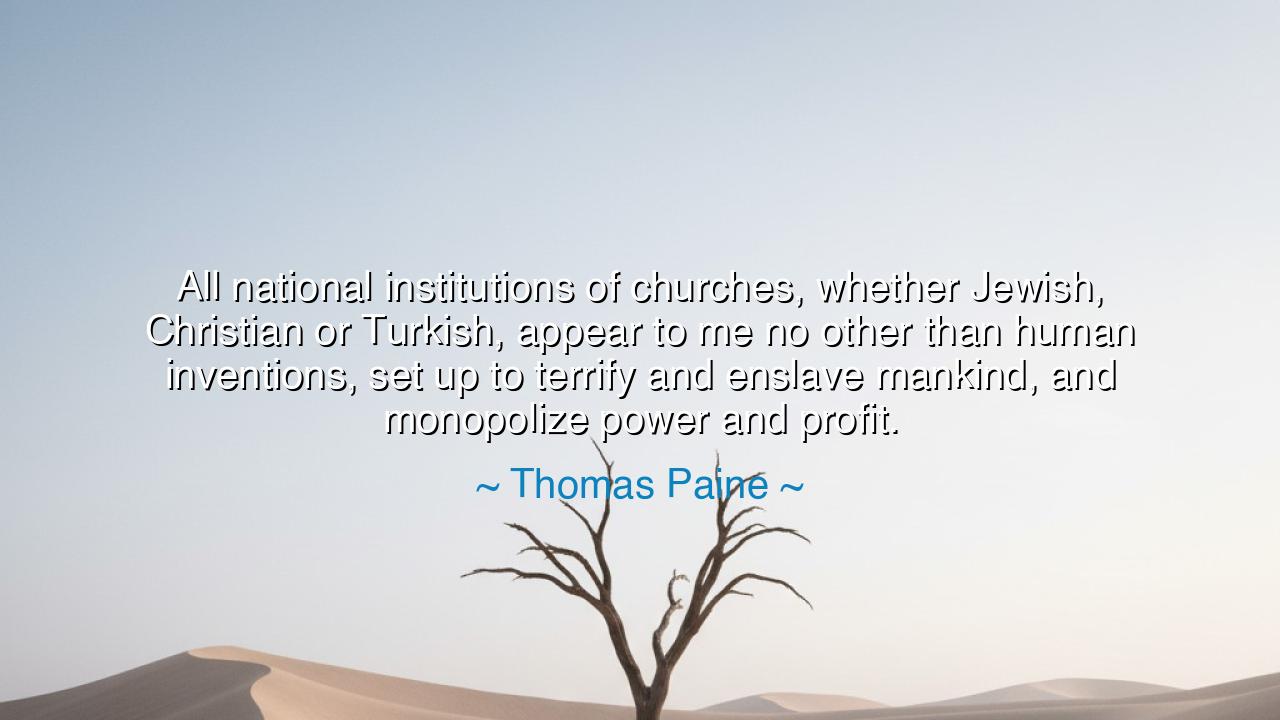
All national institutions of churches, whether Jewish, Christian
All national institutions of churches, whether Jewish, Christian or Turkish, appear to me no other than human inventions, set up to terrify and enslave mankind, and monopolize power and profit.






The words of Thomas Paine—“All national institutions of churches, whether Jewish, Christian or Turkish, appear to me no other than human inventions, set up to terrify and enslave mankind, and monopolize power and profit.”—thunder with the defiance of a prophet who sought to awaken men from the chains of fear. He saw in the grand edifices of churches not only temples of worship, but engines of control, forged by human hands to rule through superstition. To Paine, faith was not the enemy, but the corruption of faith by those who turned it into a tool for power and profit.
This utterance was born in the age of revolution. Paine, who gave the world Common Sense and inspired nations to rise against tyranny, turned his gaze also upon the tyranny of religion when it allied with thrones. He witnessed how institutions draped in sacred robes claimed divine authority to silence, terrify, and bind the common man. In his fire, he sought to tear away the veil, declaring that these were not the works of heaven, but human inventions crafted to secure dominion.
History echoes Paine’s cry in the story of the Spanish Inquisition. Cloaked in the authority of the Church, it used terror to enforce obedience, seizing wealth, crushing dissent, and burning souls in the name of purity. Yet beneath its piety was the thirst for monopoly of power, as Paine described. In such examples, his warning finds flesh: religion turned into an empire of fear, its altars built not for God, but for the preservation of privilege.
The quote also reveals Paine’s deeper vision of freedom of conscience. He was not against the spirit of belief, but against its enslavement by human institutions. For true reverence of the divine cannot be commanded by kings or priests; it must be chosen freely, springing from the heart. To Paine, the greatest blasphemy was not doubt, but the use of God’s name to enslave mankind, to strip them of thought, and to hoard earthly gain under the guise of sacredness.
Let this wisdom endure for generations: question every power that claims divinity while feeding upon fear. Recognize the difference between the eternal spirit of truth and the human inventions built to monopolize it. As Thomas Paine teaches, liberty of the soul is as sacred as liberty of the body, and neither must bow to false thrones. For only when faith is free, unchained from terror, can mankind walk in the light of both reason and reverence.






PTThanh Phong Tong
It’s fascinating how Paine’s criticism of religious institutions mirrors modern debates about the separation of church and state. His words make me wonder whether he believed humanity could ever practice faith without politics getting involved. Can spirituality remain pure when it’s tied to wealth and authority? I respect his courage to question such powerful structures, but I also wonder if his view leaves room for the positive community aspects religion can offer.
MKNhan Minh Khoi
This quote challenges me because it forces a distinction between faith as a personal experience and religion as a power system. Was Paine ahead of his time in calling out the institutionalization of belief? I can understand his frustration if he saw religion being used as a tool for control rather than enlightenment. But then again, do you think he went too far by dismissing all organized religion as inherently corrupt?
HLNGUYEN HONG LY
I find Paine’s perspective provocative but also deeply reflective. He seems to attack not spirituality itself, but the way organized institutions manipulate belief for dominance. It makes me wonder — can religion exist purely without hierarchy or corruption, or is structure inevitable when humans gather under a shared ideology? His words still feel relevant today when we see how religious institutions sometimes influence politics and economics in ways that seem self-serving.
Nnghfh
This statement feels incredibly bold, especially considering when it was written. Paine’s skepticism toward organized religion raises an important question — where is the line between genuine faith and institutional control? It makes me think about how religion can both liberate and constrain, depending on who holds authority. Do you think Paine’s view was purely political, or was it also rooted in a deeper disappointment with how religion had been used to justify oppression?